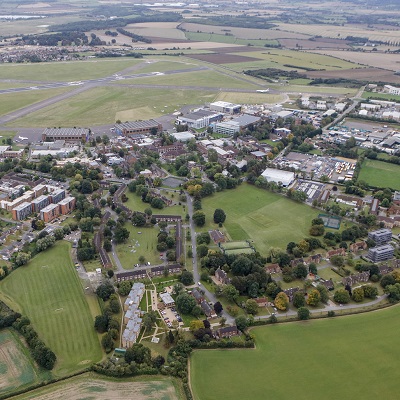Overview
- Start dateOctober
- DurationOne year full-time, two-three years part-time
- DeliveryTaught modules 40%, group project 20%, individual research project 40%
- QualificationMSc
- Study typeFull-time / Part-time
- CampusCranfield campus
Who is it for?
This course provides engineering, physics, computing or mathematics graduates with the advanced skills which can be applied to the security, defence, marine, environmental and aerospace industries. This course is also available on a part-time basis enabling you to combine studying with full-time employment.
Why this course?
Artificial intelligence (AI) and machine learning are redefining the way we live and work, allowing us to automate processes and enhance productivity. These new technologies create the need for skilled engineers with an understanding of their applications and intricacies.
Increasingly, governments are outlining AI and data revolutions as areas of priority to ensure global leadership for the industries of the future. By embedding AI, government agendas aspire to create new, high-quality jobs and drive economic growth.
Undertaking this course will allow you to be at the forefront of this ongoing technological revolution, equipping you with both the theoretical and practical knowledge to work across disciplines and implement AI systems where they are needed.
We are well located for visiting part-time students from all over the world, and offer a range of library and support facilities to support your studies, while balancing work/life commitments. Our MSc programmes benefit from a broad cultural diversity of students, which significantly enhances the learning experience for both staff and students.
Informed by industry
The course is directed by an Industrial Advisory Panel who meet twice a year to ensure that it provides the right mix of hands-on skills and up-to-date knowledge suitable to the wide variety of applications that this field addresses. The panel will also propose industry relevant research challenges that will shape the topics for individual thesis projects.
A number of members also attend the annual student thesis presentations which take place a month or so before the end of the course. This provides a good opportunity for students to meet key employers.
Course details
The course will include eight taught compulsory modules, which are generally delivered from October to March.
Students are also supported in their learning and personal development through participation in: industry seminars, group poster session, group discussions, group presentations, video demonstrations, case studies, laboratory experiments, coursework and project work. Students will receive hands-on experience accessing equipment and facilities within both our Aerospace Integration Research Centre and Intelligent Mobility Engineering Centre.
The new MSc in Applied Artificial Intelligence will use standard teaching and assessment methods as well as technology-enhanced teaching (TET) methods such as a Virtual Learning Environment (VLE) to support different learning styles. Theories and fundamental of AI will be taught in both lecture and workshop formats where videos and technology demonstrators will be used as teaching aids. Lecture videos will be available on VLE to provide an interactive learning experience.
Course delivery
Taught modules 40%, group project 20%, individual research project 40%
Group project
The aim of the group design project (GDP) is for students to design, implement, validate and test an AI-based system, showing an understanding to apply the knowledge acquired in the taught modules and integrate the various concepts. The GDP will provide invaluable experience of delivering a project within an industry structured team, developing transferable skills including team working with members with diverse backgrounds and expertise, project management and technical presentations.
Some recent projects include:
- Creating Explainable Interfaces for Autonomous Flight.
- Mapping Illegal Pollution in Cities using Drones with Electronic Nose.
- Causal Curiosity using Robot with Digital Mind.
- Dynamic Contention Pricing in Future Airspace Management.
- Violence Detection at Airports.
- Enhancing Airport Safety Using Crowd Monitoring and Social Distancing Analysis.
- Detection of Vital Signs of Myocardial Infarction Using Computer Vision and Edge AI.
Part-time students are encouraged to participate in a group project as it provides a wealth of learning opportunities. However, an option of an individual dissertation is available if agreed with the Course Director.
Individual project
The individual research project allows you to delve deeper into an area of specific interest. It is very common for industrial partners to put forward real world problems or areas of development as potential research thesis topics. For part-time students it is common that their research thesis is undertaken in collaboration with their place of work.
Some recent projects include:
- Causal Learning in Unmanned/Autonomous Vehicle Dynamic.
- Eyes-Out Airborne object detection module improving pilots Situational Awareness.
- Light-weight Deep Learning Approaches for Early Detection of Wildfire and Smoke for UAV Applications.
- Cipher Key Generation Using Graph Layer Security and Federated Multi-Agent Deep Reinforcement Learning.
- Generation of Realistic Images From 3D Simulated Environment using conditional GAN.
- Deep Autoencoders for Unsupervised Anomaly Detection in Wildfire Prediction.
- Large Language Models for Drone Navigation.
- Autonomous systems applications of Large Language models.
- Generative Modelling for Improved Situational Awareness.
- Drone camera and digital map alignment using an Augmented Reality.
Modules
Keeping our courses up-to-date and current requires constant innovation and change. The modules we offer reflect the needs of business and industry and the research interests of our staff and, as a result, may change or be withdrawn due to research developments, legislation changes or for a variety of other reasons. Changes may also be designed to improve the student learning experience or to respond to feedback from students, external examiners, accreditation bodies and industrial advisory panels.
To give you a taster, we have listed the compulsory and elective (where applicable) modules which are currently affiliated with this course. All modules are indicative only, and may be subject to change for your year of entry.
Course modules
Compulsory modules
All the modules in the following list need to be taken as part of this course.
Statistical Learning Methods
| Aim |
|
|---|---|
| Syllabus |
|
| Intended learning outcomes |
On successful completion of this module you should be able to:
|
Search and Optimisation
| Aim |
|
|---|---|
| Syllabus |
|
| Intended learning outcomes |
On successful completion of this module you should be able to:
|
Deep Learning for Computer Vision
| Aim |
|
|---|---|
| Syllabus |
|
| Intended learning outcomes |
On successful completion of this module you should be able to: 1. Explain fundamental meaning and discuss applicability of deep learning algorithms for industrial applications. |
Intelligent Cyber Physical Systems
| Aim |
|
|---|---|
| Syllabus |
|
| Intended learning outcomes |
On successful completion of this module you should be able to:
|
Data Analytics and Visualisation
| Module Leader |
|
|---|---|
| Aim |
|
| Syllabus |
|
| Intended learning outcomes |
On successful completion of this module you should be able to:
|
Deep Learning for Autonomous Decision Making
| Aim |
|
|---|---|
| Syllabus |
|
| Intended learning outcomes |
On successful completion of this module you should be able to:
|
Logic and Automated Reasoning
| Aim |
It also introduces Causal Logic linking it to the founding principles of Machine Learning. |
|---|---|
| Syllabus |
Introduction to logic representation and reasoning |
| Intended learning outcomes |
On successful completion of this module you should be able to:
|
Ethical, Regulatory and Social Aspects of AI
| Aim |
|
|---|---|
| Syllabus |
The sessions in this module will focus on three inter-related strands: ethical, regulatory, and social aspects of AI. |
| Intended learning outcomes |
On successful completion of this module you should be able to: 1. Distinguish key ethical principles and potential impacts of AI on people and society and Interpret relevant regulatory frameworks and standards 2. Evaluate social and human factors that may influence system design and algorithm bias 3. Evaluate social and human requirements of systems and scenarios 4. Appraise methodologies for the selection of appropriate and unbiased human data collection and analysis across contexts 5. Estimate the user-centred design principles that need to be applied for optimisation of human-system integration. |
Teaching team
You will be taught by our internationally renowned research and academic staff. The Course Director for this programme is Dr Yang Xing.
Accreditation
This degree has been accredited by British Computer Society (BCS), The Chartered Institute for IT for the purposes of partially meeting the academic requirement for registration as a Chartered IT Professional. Accreditation is a mark of assurance that the degree meets the standards set by BCS. An accredited degree entitles you to professional membership of BCS, which is an important part of the criteria for achieving Chartered IT Professional (CITP) status through the Institute. Some employers recruit preferentially from accredited degrees, and an accredited degree is likely to be recognised by other countries that are signatories to international accords.
Your career
Industry-led education makes Cranfield graduates some of the most desirable all over the world for recruitment by both global primes to smaller innovative start-ups looking for the brightest talent.
Graduates from this course will be equipped with the advanced skills which could be applied to the security, defence, marine, environmental and aerospace industries. This approach offers a wide range of career choices with job roles including:
- Autonomous systems engineer
- Machine learning engineer
- Applied machine learning engineer
- Data scientist
- Research scientist
- Big data engineer
Organisations that have employed graduates of this course include:
- Airbus
- Apifon
- BAE Systems
- Frazer-Nash Consultancy
- Nissan Technical Center Europe
- Rolls-Royce
Others decide to continue their education through PhD studies available within Cranfield University or elsewhere.
Cranfield’s Career Service is dedicated to helping you meet your career aspirations. You will have access to career coaching and advice, CV development, interview practice, access to hundreds of available jobs via our Symplicity platform and opportunities to meet recruiting employers at our careers fairs. Our strong reputation and links with potential employers provide you with outstanding opportunities to secure interesting jobs and develop successful careers. Support continues after graduation and as a Cranfield alumnus, you have free life-long access to a range of career resources to help you continue your education and enhance your career.
Part-time route
We welcome students looking to enhance their career prospects whilst continuing in full-time employment. The part-time study option that we offer is designed to provide a manageable balance that allows you to continue employment with minimal disruption whilst also benefiting from the full breadth of learning opportunities and facilities available to all students. The University is very well located for visiting part-time students from all over the world and offers a range of library and support facilities to support your studies.
As a part-time student you will be required to attend teaching on campus in one-week blocks, for a total of 8 blocks over the 2-3 year period that you are with us. Teaching blocks are typically run during the period from October to March, followed by independent study and project work where contact with your supervisors and cohort can take place in person or online.
Normally part-time students are recommended to complete 4 modules in the first year (suggested modules are: Systems Engineering, Intelligent and Cyber Physical Systems, Logic and Automated Reasoning and Ethical, Regulatory and Social Aspects of AI) and 4 modules (suggested modules are: Statistical Learning Methods, Search and Optimisation, Data Analytics and Visualisation, Deep Learning) plus the Group Design Project/Dissertation in the second year. In the case of part-time students, the Group Design Project can be replaced by an Individual Dissertation (from April to August) during the second year. The final year is expected to be focused on the Individual Research Project.
We believe that this setup allows you to personally and professionally manage your time between work, study and family commitments, whilst also working towards achieving a Master's degree.
How to apply
Click on the ‘Apply now’ button below to start your online application.
See our Application guide for information on our application process and entry requirements.
The Applied Artificial Intelligence course at Cranfield University has been a transformative journey for me. Coming from a background as a Data Scientist and Software Engineer, I sought a deeper understanding of AI's mathematical foundations and practical applications. This program not only demystified the complex algorithms behind AI but also provided a unique opportunity to apply these insights within the aerospace domain. It has been instrumental in equipping me with the skills necessary to excel in my role at ANRA Technologies, where I now contribute as a Software Engineer and an AI subject matter expert in UTM, U-Space services, and automation. The course has truly enabled me to leverage digital transformation technologies, such as AI and to be a technology enabler in my field.
The course at Cranfield nurtured my existing strengths and domain expertise while building my skills in Artificial Intelligence Applications in the industry. The highlight of the course was the opportunity to work with industry partners during my thesis, allowing me to apply the knowledge I learnt in the year. I feel the environment at Cranfield really allowed me to develop my potential and prepare myself for the industry. Thanks to my course I am currently working at Airbus in the department of Flight Physics as we develop the future of aerospace.















